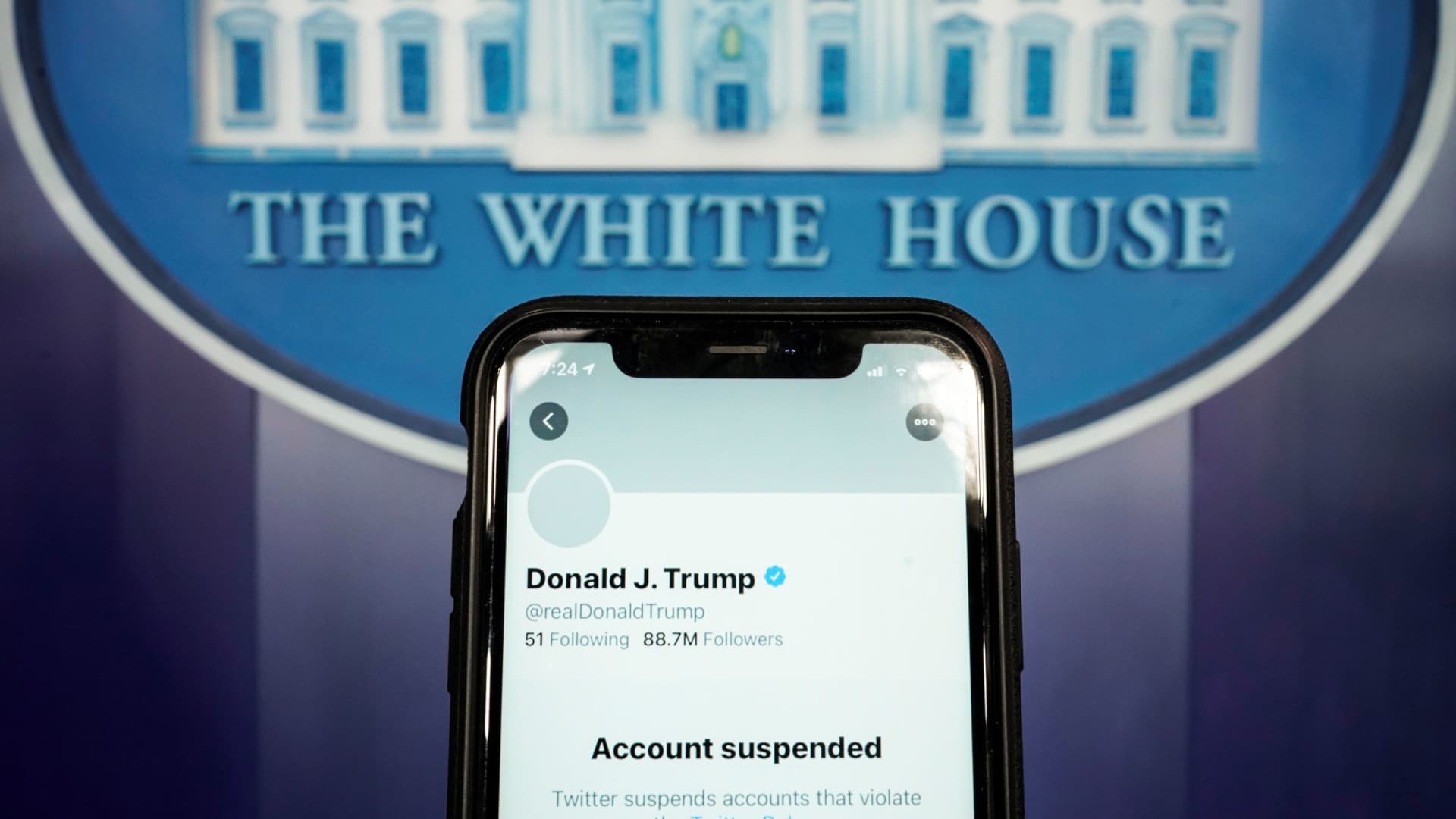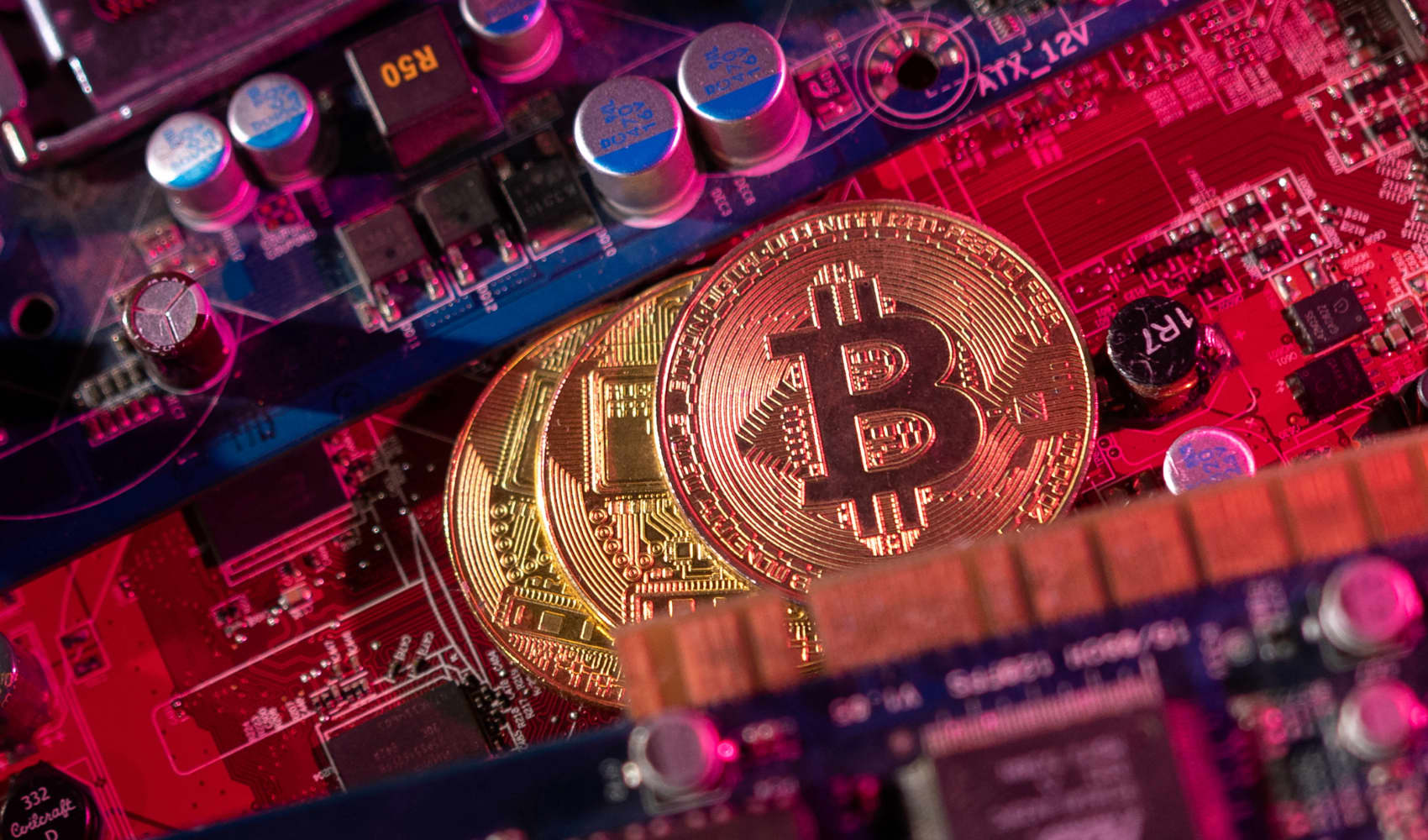- Twitter permanently suspended President Donald Trump's account on Friday.
- The decision came after Facebook made a similar call recently, extending an initial 24-hour suspension to an indefinite one.
- Trump first was banned temporarily by both platforms on Wednesday in the midst of a riot where his supporters stormed the U.S. Capitol as lawmakers proceeded with the formality of counting Electoral College votes.
Twitter permanently suspended President Donald Trump's account on Friday.
The company said in a tweet it made the decision "due to the risk of further incitement of violence."
Twitter said it feared Trump's most recent tweets were being interpreted as supporting the rioters and that plans for future armed protests had already been proliferating both on and off the platform, including a proposed attack on the U.S. Capitol and state capitol buildings on Jan. 17.
The suspension amounts to a ban: Trump can no longer access his account and his tweets and profile picture have been deleted. Trump had 88.7 million followers prior to his suspension. Institutional accounts such as @POTUS and @WhiteHouse are still active.
Money Report
Trump later tweeted a statement from the @POTUS account before it appeared to be deleted. Later Friday, the same statement was shared by the Trump campaign's Twitter account before that entire account was permanently.
"As we've said, using another account to try to evade a suspension is against our rules," a Twitter spokesperson said in a statement.
Twitter said it would not suspend institutional accounts like @POTUS unless it had to in order to avoid real-world harm, but that it could limit those accounts' capabilities. Those accounts will be transferred to the next administration.
In Trump's statement, he accused Twitter employees of having "coordinated with the Democrats and the Radical Left in removing my account from their platform, to silence me — and YOU, the 75,000,000 great patriots who voted for me. Twitter may be a private company, but without the government's gift of Section 230 they would not exist for long."
Trump was referring to Section 230 of the Communications Decency Act, the law that protects tech platforms from legal liability for their users' posts and for moderating them. The Trump campaign account also shared an image of the usually blue Twitter logo in red with a yellow hammer and sickle, symbols associated with communism.

Suspending Trump's account is a step Twitter has resisted taking for all of Trump's presidency. While President Barack Obama was the first president to use Twitter, he mainly used the institutional @POTUS account, and did not rely on it as heavily as Trump has to get his message out. Trump used his personal Twitter account to stoke supporters and even announce personnel changes before putting out a press release.
"Without the tweets, I wouldn't be here," Trump told the Financial Times in a 2017 interview.
Without access to Twitter or Facebook for the foreseeable future, any of Trump's post-presidency plans will be funneled through a smaller megaphone. While Trump can easily jump to another platform like Parler, which has billed itself as a less restrictive platform, his messages there will be directly delivered to a much smaller group of followers.
Trump and his conservative allies in Congress took aim at Twitter whenever the company moved to label or fact-check his posts. When Twitter began to fact-check Trump's tweets for the first time last spring, Trump soon introduced an executive order taking aim at Section 230. Many viewed the order as retaliation for Twitter's decision.
Twitter made special rules to exempt sitting world leaders from several of its policies, though it would still label or reduce distribution of messages that violated policies.
But with some of those same Trump allies criticizing Trump in the aftermath of the riot at the U.S. Capitol, Twitter finally made the decision that many Democrats had been calling for long ago.
Notably, Vice President-elect Kamala Harris had called on Twitter CEO Jack Dorsey directly to ban Trump during her own presidential campaign in fall 2019. At the time, even staunch tech critic Sen. Elizabeth Warren, D-Mass., a fellow presidential contender, declined to join in that call during a debate.
After the suspension, a few GOP members who frequently criticize Twitter for alleged bias against conservatives admonished so-called cancel culture and questioned why Twitter hadn't taken similar action on Iran's leader.
The decision to suspend Trump's Twitter account came after Facebook made a similar call, extending an initial 24-hour suspension to an indefinite one that CEO Mark Zuckerberg said would last at least through the end of Trump's term.
The White House did not immediately respond to a request for comment.
Shares of Twitter fell more than 3% after hours on the news.
Why Twitter pulled the plug
Trump first was banned temporarily by both Facebook and Twitter on Jan. 6 in the midst of a riot where his supporters stormed the U.S. Capitol as lawmakers proceeded with the formality of counting Electoral College votes. Many lawmakers and even former members of Trump's administration criticized Trump for encouraging his supporters to reject the election results and protest at the Capitol. Congress later reaffirmed Joe Biden's victory in the presidential election.
As the riot unfolded, Trump tweeted messages encouraging nonviolence, though he later released a video message that also reiterated his unsubstantiated claim that the election was stolen from him and told rioters, "We love you."
Twitter initially blocked some of Trump's tweets from public view on Wednesday and required he delete them to regain access to his account. After the deletion, he was locked out of the account for another 12 hours. But, Twitter warned, future policy violations would result in permanent suspension of Trump's account.
In his first tweet after returning to Twitter on Jan. 7, Trump posted a video message urging calm and giving the closest thing to a concession speech yet, saying there would be a transition to a new administration. Still, he told supporters, "Our incredible journey is only just beginning."
On Friday, Trump tweeted for the second time since his initial suspension, saying, "The 75,000,000 great American Patriots who voted for me, AMERICA FIRST, and MAKE AMERICA GREAT AGAIN, will have a GIANT VOICE long into the future. They will not be disrespected or treated unfairly in any way, shape or form!!!"
Later, Trump tweeted, "To all of those who have asked, I will not be going to the Inauguration on January 20th."
Twitter said in a blog post that the two tweets "must be read in the context of broader events in the country and the ways in which the President's statements can be mobilized by different audiences, including to incite violence, as well as in the context of the pattern of behavior from this account in recent weeks."
Twitter determined those tweets violated its Glorification of Violence Policy, prompting the ban.
The company broke down the reasons it believed those tweets violated the policy, including that his message that he would not attend the inauguration "is being received by a number of his supporters as further confirmation that the election was not legitimate." Twitter also feared that tweet could be viewed by supporters as a signal it would be "safe" to plan violent acts around the event since he would not be there.
Twitter also said Trump's characterization of his supporters as "American Patriots" was being viewed by some as support for the violent acts at the Capitol. The company noted that Trump's assertion that supporters would have a "GIANT VOICE long into the future" was undermining the idea that there would in fact be an orderly transition.
The suspensions from Facebook and Twitter represent a major shift at the companies, which have up until now avoided taking such a drastic measure on Trump's accounts. Executives at both companies have been faced with intense criticism accusing them of treating Trump's and other conservatives' accounts unfairly, which both have denied.
Now, the platform's role in perpetuating messages from the president and his supporters who planned the riot are being scrutinized by the public.
WATCH: Social media platforms block Trump after violence on Capitol Hill






